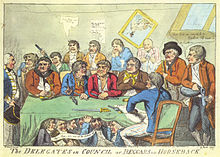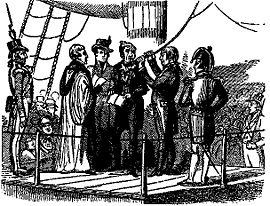- Spithead and Nore mutinies
-
The Spithead and Nore mutinies were two major mutinies by sailors of the Royal Navy in 1797. There were also discontent and minor incidents on ships in other locations in the same year. They were not violent insurrections, being more in the nature of strikes, demanding better pay and conditions. The mutinies were potentially dangerous for Britain, because at the time the country was at war with Revolutionary France. There were also concerns among some members of the British ruling class that the mutinies might be the trigger to a wider uprising similar to the French Revolution.
Contents
Spithead
The mutiny at Spithead (an anchorage near Portsmouth) lasted from 16 April-15 May 1797. Sailors on 16 ships in the Channel Fleet, commanded by Admiral Lord Bridport, protested at the living conditions aboard Royal Navy vessels and demanded a pay raise.
Seamen's pay rates had been established in 1658, and because of the stability of wages and prices, they were still reasonable as recently as the 1756–1763 Seven Years' War; however, high inflation during the last decades of the 18th century had then severely eroded the real value of the pay. At the same time the practice of coppering the submerged part of hulls, which started in 1761, meant that British warships no longer had to return to port frequently to have their hulls scraped, and the additional time at sea significantly altered the rhythm and difficulty of seamen's work. The Royal Navy had not yet made adjustments for any of these changes, and was slow to understand their effects on its crews. Finally, the new wartime quota system meant that crews had many landsmen from inshore, who did not mix well with the career seamen (volunteers or pressed men), leading to discontented ships' companies.
The mutineers were led by elected delegates and tried to negotiate with the Admiralty for two weeks, focusing their demands on better pay, the abolition of the 14-ounce "purser's pound" (the ship's purser was allowed to keep two ounces of every true pound—16 ounces—of meat as a perquisite), and the removal of a handful of unpopular officers; neither flogging nor impressment was mentioned in the mutineers demands. The mutineers maintained regular naval routine and discipline aboard their ships (mostly with their regular officers), allowed some ships to leave for convoy escort duty or patrols, and promised to suspend the mutiny and go to sea immediately if French ships were spotted heading for English shores.
Because of mistrust, especially over pardons for the mutineers, the negotiations broke down, and minor incidents broke out with several unpopular officers sent to shore and others treated with signs of deliberate disrespect. When the situation calmed, Admiral Lord Howe intervened to negotiate an agreement that saw a Royal pardon for all crews, reassignment of some of the unpopular officers, and a pay raise and abolition of the purser's pound. Afterward, the mutiny was to become nicknamed "breeze at Spithead".
The leader of the mutiny remained anonymous even after its resolution. Rumours during the time placed Valentine Joyce as the mastermind. Joyce was a quartermaster's mate aboard Lord Bridport′s Royal George.[1]
The Nore
Inspired by the example of their comrades at Spithead, the mutiny at the Nore (an anchorage in the Thames Estuary) began on 12 May when the crew of Sandwich seized control of the ship. Several other ships in the same location followed this example, though others slipped away and continued to slip away during the mutiny, despite gunfire from the ships remaining (who attempted to use force to hold the mutiny together). The mutineers had been unable to organise easily because the ships were scattered along the Nore (and not all part of a unified fleet, as at Spithead), but they quickly elected delegates for each ship. Richard Parker was elected "President of the Delegates of the Fleet" due to his obvious intelligence, education and empathy with the suffering of the sailors. Parker was a former master's mate who was disrated and court-martialed in December 1793, and reenlisted in the Navy as a seaman in early 1797. Demands were formulated and on 20 May, a list of eight demands was presented to Admiral Buckner, which mainly involved pardons, increased pay and modification of the Articles of War, eventually expanding to a demand that the King dissolve Parliament and make immediate peace with France. These demands infuriated the Admiralty, which offered nothing except a pardon (and the concessions already made at Spithead) in return for an immediate return to duty.
The mutineers expanded their initial grievances into the beginnings of a social revolution and blockaded London, preventing merchant vessels from entering the port, and the principals made plans to carry their ships to France, alienating the regular English sailors and losing more and more ships as the mutiny progressed. After the successful resolution of the Spithead mutiny, the government and the Admiralty were not minded to make further concessions, particularly as they felt some leaders of the Nore mutiny had political aims beyond pay and living conditions of the crews on board ship.
The mutineers were denied food, and when Parker hoisted the signal for the ships to sail to France, all of the remaining ships refused to follow; eventually, most other ships slipped their anchors and deserted (some under fire from the mutineers), and the mutiny failed. Parker was quickly convicted of treason and piracy and hanged from the yardarm of Sandwich, the vessel where the mutiny had started. In the reprisals which followed, a total of 29 leaders were hanged, others sentenced to be flogged, imprisoned or transported to Australia. The vast majority of the crews on the ships involved in the mutiny suffered no punishment at all.
After the Nore mutiny, Royal Navy vessels no longer rang five bells on the last dog watch, as that had been the signal to begin the mutiny. [2]
Other mutinies and discontent in 1797
In September 1797, the crew of the Hermione mutinied in the West Indies, killing almost all the officers in revenge for a number of grievances including the throwing into the sea of the bodies of three men who had been killed in falling from the rigging in a desperate scramble to avoid flogging for being last man down on deck.[3]
On 27 December, the crew of Marie Antoinette murdered their officers and took their ship into a French port in the West Indies.[4]
Other mutinies took place off the coast of Ireland and at the Cape of Good Hope and spread to the fleet under Admiral Jervis off the coast of Spain.
In the arts
- Herman Melville's novel Billy Budd, and the opera based on it by Benjamin Britten, are set immediately after the main mutinies.
- The Men They Couldn't Hang, an English folk-punk group, commemorated the executed leaders of the mutiny in the ballad "The Colours" (1988).
- Mutiny by Julian Stockwin is a fictional account of the Nore mutiny.
- The movie H.M.S. Defiant is a fictional account of a similar mutiny at sea at this time.
- The father of the protagonist of Frederick Marryat's The King's Own was hanged for his part in the Nore mutiny.
- Much of the Dewey Lambdin novel A King's Captain is set during the Nore Mutiny as seen by the protagonist, Alan Lewrie.
Notes
- ^ Roberts 2006
- ^ "Nore Mutiny". Museum of Learning. http://www.museumstuff.com/learn/topics/Nore_mutiny::sub::The_Nore. Retrieved 2011-09-12.
- ^ Tracy. Who's who in Nelson's Navy. p. 294.
- ^ The Royal Navy. A History from the Earliest Times to 1900, William Clowes, Volume 4, p. 548
"The Floating Republic - An account of the Mutinies at Spithead and The Nore in 1797", by G.E. Manwaring and Bonamy Dobrée published by Frank Cass & Co. 1935 is a history of these mutinies.
References
- "The Floating Republic" - Dobree and Manwaring (1935) ISBN 0-09-173154-2
- The Great Mutiny - James Dugan (1965)
- The naval mutinies of 1797 - Conrad Gill (Manchester University Press, 1913)
- "A Sense of the World: How a Blind Man Became History's Greatest Traveler" - Roberts (2006) ISBN 0-00-716106-9
- A Brief History of Mutiny — Richard Woodman (2005) ISBN 0786715677
- Tracy, Nicholas (2006). Who's who in Nelson's Navy: 200 Naval Heroes. London: Chatham Publishing. ISBN 1-86176-244-5.
- "Born in Exeter" a biography Chapter on Richard Parker - By The Historical Society of Hele's School Exeter (1950) Publisher A. Wheaton & Company Ltd Exeter
See Also
- Chilean naval mutiny of 1931
- HNLMS De Zeven Provinciën (1909)#Mutiny in the Indies
- Royal Indian Navy Mutiny
- Chilean naval mutiny of 1931
- Kronstadt rebellion
- Wilhelmshaven mutiny
- HNLMS De Zeven Provinciën (1909)#Mutiny in the Indies
- Invergordon Mutiny
- Revolt of the Lash
External links
Categories:- History of the Royal Navy
- Naval mutinies
- 1797 in Great Britain
- 1797 in military history
Wikimedia Foundation. 2010.


